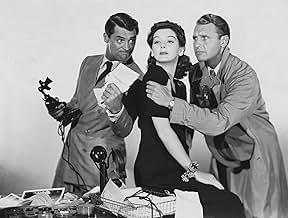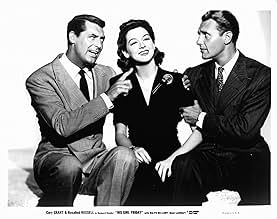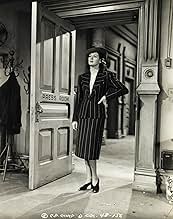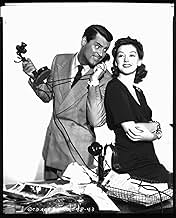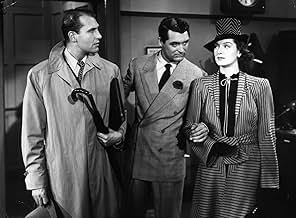When a newspaper editor's ace reporter ex-wife is about to quit her job and remarry, he buys himself time to win her back by promising her an exclusive interview with a death row convict.When a newspaper editor's ace reporter ex-wife is about to quit her job and remarry, he buys himself time to win her back by promising her an exclusive interview with a death row convict.When a newspaper editor's ace reporter ex-wife is about to quit her job and remarry, he buys himself time to win her back by promising her an exclusive interview with a death row convict.
- Awards
- 5 wins & 1 nomination total
7.866.9K
1
2
3
4
5
6
7
8
9
10
Featured reviews
10robb_772
As close to perfection as any film could hope for
As if creating one comedic masterpiece with 1938's BRINGING UP BABY was not enough, director Howard Hawks returned to the same genre a scant two years later - and he somehow managed to rival even his own previous masterwork. Nominally a reworking Ben Hecht and Charles MacArthur's play THE FRONT PAGE, HIS GIRL Friday manages to surpass it's classic source material and emerge as one of the screen's finest comedies. The film is also perhaps the perfect example of Hawks' trademarked rapid-fire, overlapping dialogue, which has never been as fast nor as furious anywhere else before or since. This is certainly one of the fastest moving comedies ever filmed, and the whole cast never misses a beat.
Walter Burns, the conniving, self-serving newspaper editor, is a character that could have easily come off as a tyrannical jerk. As portrayed by the suave Cary Grant, however, the pompous, arrogant Burns actually becomes (gasp!) likable! It is a difficult balancing act that Grant must perform as teetering between the two extremes of the character, and he is arguably the only actor imaginable with the skill and charisma to pull such a tricky characterization off this successfully. And the one-and-only Rosalind Russell is every bit his match - full of verve and aplomb, Russell's Hildy is an independent career woman, brimming with intelligence and class, that impressively pre-dates the major feminist movement of the mid-sixties by a good 25 years.
The film's supporting cast is no less impressive, with every single role cast to perfection. This is particularly true of Ralph Bellamy, who (along with his Oscar-nominated performance in 1937's THE AWFUL TRUTH) proves once again that he is the ultimate straight man. The film contains some grim subject matter that may seem like unlikely fodder for a screwball comedy (murder, attempted suicide, and public execution are all touched upon), although the film somehow manages to deal with such topics respectfully and without sacrificing any laughs. In the end, HIS GIRL Friday is an absolutely unbeatable romantic comedy that remains wildly hilarious and comes as close to sheer perfection as any motion picture could ever hope to.
Walter Burns, the conniving, self-serving newspaper editor, is a character that could have easily come off as a tyrannical jerk. As portrayed by the suave Cary Grant, however, the pompous, arrogant Burns actually becomes (gasp!) likable! It is a difficult balancing act that Grant must perform as teetering between the two extremes of the character, and he is arguably the only actor imaginable with the skill and charisma to pull such a tricky characterization off this successfully. And the one-and-only Rosalind Russell is every bit his match - full of verve and aplomb, Russell's Hildy is an independent career woman, brimming with intelligence and class, that impressively pre-dates the major feminist movement of the mid-sixties by a good 25 years.
The film's supporting cast is no less impressive, with every single role cast to perfection. This is particularly true of Ralph Bellamy, who (along with his Oscar-nominated performance in 1937's THE AWFUL TRUTH) proves once again that he is the ultimate straight man. The film contains some grim subject matter that may seem like unlikely fodder for a screwball comedy (murder, attempted suicide, and public execution are all touched upon), although the film somehow manages to deal with such topics respectfully and without sacrificing any laughs. In the end, HIS GIRL Friday is an absolutely unbeatable romantic comedy that remains wildly hilarious and comes as close to sheer perfection as any motion picture could ever hope to.
10banjoboy
What a gem!
I just finished watching the DVD of this first-class, semi-Screwball comedy in Columbia Classics beautiful transfer, and it absolutely made my day! What a movie! What a screenplay! The dialogue is better - more modern - in fact, than a in lot of contemporary movies. It's incredibly funny, too, and my teenage sons kept laughing right along with me at the smart come-backs. Cary Grant is, of course, as good (if not better) than ever, and I've never seen Rosalind Russel in a role that suited her more perfectly. And that's just for starters: The timing of the thing is still awe- inspiring after sixty-odd years; the supporting actors, down to the bit-players, are all memorable, convincing and hilarious; the camera work (this IS the forties, though) is inventive and the editing superb. I can safely confess now that I hadn't ever seen it before, but that's no reason for you to make the same mistake: Go buy/rent it NOW! Hats off to the great Howard Hawks, his cast and crew for pulling this comedy masterpiece off. And thank you, thank you, thank you Columbia Pictures, for
making it possible for me to watch it in such pristine condition! (I've got the 2002 edition, and from what I've heard you should beware of earlier DVD issues).
making it possible for me to watch it in such pristine condition! (I've got the 2002 edition, and from what I've heard you should beware of earlier DVD issues).
Her Guy Walter
Charles McArthur and Ben Hecht met when both were reporters in Chicago during the 1920s. They created two of the funniest farces in American drama, TWENTIETH CENTURY (about theater people) and THE FRONT PAGE. The latter was based on their experiences as news reporters in those crazy days in Chicago, where the newspapers concentrated on sensationalism and the politics was thoroughly corrupt. The resulting play is hysterically funny and yet remains timely. For all the exaggeration of how Walter Burns and Hildy Johnson manipulate police, politicians, reporters, and civilians to get their scoop, the story remains relevant for several reasons. The political balance in a big Mayoralty election is precarious due to the Earl Williams case. Williams has shot a policeman who is African-American, a big local voting block, and they want him punished. The corrupt Mayor and his idiot jail warden are willing to execute him for the votes needed to stay in office, but the Governor (who is from the rival party) believes the killer is insane (or at least mentally deficient). So already (as you see) race, politics, and the validity of the death penalty get pulled in. Soon we also see examples of nepotism and corruption in the police, and City Hall, cynical politics based on a man's life, and questions about privacy and a free press. For a play from 1931 this one still has relevance.
There had been an earlier version of the play in the 1930s called THE FRONT PAGE, starring Adolphe Menjou as the conniving and devious Walter Burns, and Pat O'Brien as ace reporter Hildy Johnson. It is a good version, and both stars do well with their parts (and both have the verbal speed necessary for the dialog to flow over the ears of the audience). But when the film was remade in 1940, Howard Hawks decided to redraw Hildy Johnson into a female reporter (and previous wife) of Burns. His casting of Cary Grant was radically different too. Burns is a nasty, conniving s.o.b. who would kill for a good story. Menjou was somewhat dapper (he was usually dapper) in the role, but the hardness under the presentable shell was there. And by changing Hildy from a guy to a gal, and Walter's former wife, you had to make Walter look more interesting. So Walter is turned into Cary Grant. There was a search for Hildy, involving Jean Arthur and Irene Dunne as possibilities. Neither ended up playing him. Instead it went to Rosalind Russell.
It has to be admitted Russell had the vocal abilities to push the dialog at the proper clip. Possibly Jean Arthur could have done that just as well, but Arthur did not have the apparent physical strength behind the stylishness that Russell showed. She really does balance well (in this film) with Grant, given their characters.
Motivation changes a little. This Walter Burns still wants to get his scoops, but there are moments of fragility when he realizes he may forever lose Hildy to her fiancé Bruce (the ever helpless Ralph Bellamy). And they oddly work (Hawks manages to keep them under control). Also, as the story is now twelve years older than the original play, certain changes occur in Walter's political views. He does dislike the gang (led by Clarence Kolb and Gene Lockhart) running the city, and points out to Hildy that they have a chance to help give the city the sort of government New York City has under La Guardia. This does not end his joy at scooping the opposition, but it does suggest that Burns has more depth.
It is now generally believed that this is the best of the film versions of THE FRONT PAGE, and one of the funniest films ever made. The entire cast shines (look at the scene where Helen Mack confronts the reporters who have made her look like a tramp, and have told lies about John Qualen (Williams) - she is in a state when Russell takes her out of the press room, and the reporters are thoroughly ashamed of herself - and Russell comes back looking at Regis Toomey, Porter Hall, and the others, and says "Gentlemen of the Press!" with heavy cynical irony). And also note Billy Gilbert's immortal Joe Pettibone, the most hopeless monument of total befuddlement in movies. It is one of the few film comedies of that period that retains it's laughs one viewing following another.
There had been an earlier version of the play in the 1930s called THE FRONT PAGE, starring Adolphe Menjou as the conniving and devious Walter Burns, and Pat O'Brien as ace reporter Hildy Johnson. It is a good version, and both stars do well with their parts (and both have the verbal speed necessary for the dialog to flow over the ears of the audience). But when the film was remade in 1940, Howard Hawks decided to redraw Hildy Johnson into a female reporter (and previous wife) of Burns. His casting of Cary Grant was radically different too. Burns is a nasty, conniving s.o.b. who would kill for a good story. Menjou was somewhat dapper (he was usually dapper) in the role, but the hardness under the presentable shell was there. And by changing Hildy from a guy to a gal, and Walter's former wife, you had to make Walter look more interesting. So Walter is turned into Cary Grant. There was a search for Hildy, involving Jean Arthur and Irene Dunne as possibilities. Neither ended up playing him. Instead it went to Rosalind Russell.
It has to be admitted Russell had the vocal abilities to push the dialog at the proper clip. Possibly Jean Arthur could have done that just as well, but Arthur did not have the apparent physical strength behind the stylishness that Russell showed. She really does balance well (in this film) with Grant, given their characters.
Motivation changes a little. This Walter Burns still wants to get his scoops, but there are moments of fragility when he realizes he may forever lose Hildy to her fiancé Bruce (the ever helpless Ralph Bellamy). And they oddly work (Hawks manages to keep them under control). Also, as the story is now twelve years older than the original play, certain changes occur in Walter's political views. He does dislike the gang (led by Clarence Kolb and Gene Lockhart) running the city, and points out to Hildy that they have a chance to help give the city the sort of government New York City has under La Guardia. This does not end his joy at scooping the opposition, but it does suggest that Burns has more depth.
It is now generally believed that this is the best of the film versions of THE FRONT PAGE, and one of the funniest films ever made. The entire cast shines (look at the scene where Helen Mack confronts the reporters who have made her look like a tramp, and have told lies about John Qualen (Williams) - she is in a state when Russell takes her out of the press room, and the reporters are thoroughly ashamed of herself - and Russell comes back looking at Regis Toomey, Porter Hall, and the others, and says "Gentlemen of the Press!" with heavy cynical irony). And also note Billy Gilbert's immortal Joe Pettibone, the most hopeless monument of total befuddlement in movies. It is one of the few film comedies of that period that retains it's laughs one viewing following another.
"You've got an old fashioned idea divorce is something that lasts forever..."
"His Girl Friday" is a romantic comedy that belongs almost entirely to the screwball tradition. The screenplay is adapted from the 1928 play "The Front Page" by Ben Hecht and Charles MacArthur. This is the second, and by far the most successful, film adaptation of that story.
We follow former star reporter Hildy Johnson, who is about to marry insurance agent Bruce Baldwin. Their plan is simple: to start a family and settle into a quiet life in Albany. But there's a catch-Hildy happens to be the ex-wife of Walter Burns, a ruthless and manipulative newspaper editor determined to derail their plans. Walter convinces Hildy to cover just one more story before she leaves with Bruce. The case seems simple-a chance killing-but beneath it lies a tangle of political corruption. Hildy agrees, on the condition that Walter buys a life insurance policy from Bruce, but by doing so she steps straight into Walter's treacherous game...
Howard Hawks directs with a whirlwind pace: the lines are exchanged at lightning speed, often without pause, like bursts of rapid-fire. This rhythm adds energy to the comedy and makes the escalating entanglements feel endless. Hawks was known to allow improvisation, cutting a scene only when it was necessary to move on to the next sequence. The result is that the audience feels immersed in the true circus of a newsroom. The camera faithfully follows the protagonists, while close-ups highlight the irony and satirical edge of their relationships. Romance here takes a back seat, almost as if life itself is unfair to Hildy. It's clear, however, that ambition drives every character forward.
Thematically, the film exposes corrupt politics and the sensationalism of the press, through the fate of a condemned man abandoned by the justice system. Its characters move through a sharp, cynical game that raises questions about ambition, marriage, emancipation, and honesty in relationships.
Cary Grant is outstanding as Walter Burns-manipulative, unscrupulous, and yet irresistibly charming. He is both an editorial demon and a slippery seducer, and yet the audience can't help but root for him. His charisma makes us sympathize with him, even when we cannot fully grasp his motives. Once again, Grant is flawless in his element.
Rosalind Russell plays Hildy Johnson, the beating heart of the film. Hildy is smart, witty, and resourceful-a woman torn between her desire for domestic peace and the irresistible pull of reporting. She holds her own against Walter in every exchange, and their chemistry, especially in their quarrels, is nothing short of electric.
Ralph Bellamy, as Bruce Baldwin, is the good-natured, gentlemanly fiancé who is hopelessly out of place in the chaos of journalism. His character is the complete opposite of Walter and Hildy, providing a perfect counterbalance that deepens the comedy. Bellamy is superb in the role, though one might joke that his fans should start a petition never to cast him opposite Grant again-because no one escapes Walter's tricks unscathed.
"His Girl Friday" is a film about the speed of life, the power of words, and the manipulative games that unfold within the noisy world of politics and journalism. Love and professional passion collide in a single point, while truth remains as slippery and fleeting as a tabloid headline. For lovers of romantic comedy, this film is essential viewing and stands as one of the finest examples of the genre from the 1940s.
We follow former star reporter Hildy Johnson, who is about to marry insurance agent Bruce Baldwin. Their plan is simple: to start a family and settle into a quiet life in Albany. But there's a catch-Hildy happens to be the ex-wife of Walter Burns, a ruthless and manipulative newspaper editor determined to derail their plans. Walter convinces Hildy to cover just one more story before she leaves with Bruce. The case seems simple-a chance killing-but beneath it lies a tangle of political corruption. Hildy agrees, on the condition that Walter buys a life insurance policy from Bruce, but by doing so she steps straight into Walter's treacherous game...
Howard Hawks directs with a whirlwind pace: the lines are exchanged at lightning speed, often without pause, like bursts of rapid-fire. This rhythm adds energy to the comedy and makes the escalating entanglements feel endless. Hawks was known to allow improvisation, cutting a scene only when it was necessary to move on to the next sequence. The result is that the audience feels immersed in the true circus of a newsroom. The camera faithfully follows the protagonists, while close-ups highlight the irony and satirical edge of their relationships. Romance here takes a back seat, almost as if life itself is unfair to Hildy. It's clear, however, that ambition drives every character forward.
Thematically, the film exposes corrupt politics and the sensationalism of the press, through the fate of a condemned man abandoned by the justice system. Its characters move through a sharp, cynical game that raises questions about ambition, marriage, emancipation, and honesty in relationships.
Cary Grant is outstanding as Walter Burns-manipulative, unscrupulous, and yet irresistibly charming. He is both an editorial demon and a slippery seducer, and yet the audience can't help but root for him. His charisma makes us sympathize with him, even when we cannot fully grasp his motives. Once again, Grant is flawless in his element.
Rosalind Russell plays Hildy Johnson, the beating heart of the film. Hildy is smart, witty, and resourceful-a woman torn between her desire for domestic peace and the irresistible pull of reporting. She holds her own against Walter in every exchange, and their chemistry, especially in their quarrels, is nothing short of electric.
Ralph Bellamy, as Bruce Baldwin, is the good-natured, gentlemanly fiancé who is hopelessly out of place in the chaos of journalism. His character is the complete opposite of Walter and Hildy, providing a perfect counterbalance that deepens the comedy. Bellamy is superb in the role, though one might joke that his fans should start a petition never to cast him opposite Grant again-because no one escapes Walter's tricks unscathed.
"His Girl Friday" is a film about the speed of life, the power of words, and the manipulative games that unfold within the noisy world of politics and journalism. Love and professional passion collide in a single point, while truth remains as slippery and fleeting as a tabloid headline. For lovers of romantic comedy, this film is essential viewing and stands as one of the finest examples of the genre from the 1940s.
The Front Page remade
This gloriously funny romp by Howard Hawks is rightly remembered as one of the fastest-talking movies ever made. Originally done as 'The Front Page', the play by Hecht and McArthur takes on new life here as the character of Hildy Johnson metamorphoses in this version to be a sparky woman (played by Rosalind Russell), former wife of the harassed columnist Walter Burns (played with characteristic bewilderment and charm by Cary Grant). Hildy is about to marry again, to the nice but dull Bruce Baldwin (played by Ralph Bellamy as a character so boring he 'is like Ralph Bellamy' - how Hollywood liked its in-jokes).
With that fire-cracking script, a sizable amount of sparks between Grant and Russell, and good support from Bellamy and a cast which includes Gene Lockhart, Cliff Edwards, Clarence Kolb, and Regis Toomey, 'His Girl Friday' is one of those classic gems which never age and which remain hugely entertaining.
With that fire-cracking script, a sizable amount of sparks between Grant and Russell, and good support from Bellamy and a cast which includes Gene Lockhart, Cliff Edwards, Clarence Kolb, and Regis Toomey, 'His Girl Friday' is one of those classic gems which never age and which remain hugely entertaining.
Did you know
- TriviaRosalind Russell thought, while shooting, that she didn't have as many good lines as Cary Grant had, so she hired an advertisement writer through her brother-in-law and had him write more clever lines for the dialog. Since Howard Hawks allowed for spontaneity and ad-libbing, he, and many of the cast and crew didn't notice it, but Grant knew she was up to something, leading him to greet her every morning: "What have you got today?"
- GoofsWhen Bruce Baldwin comes to the press room late in the movie, an electric fan and small shelf on the wall to the left of the door both completely disappear. Both have been there in all previous scenes and both reappear after this scene.
- Quotes
[describing Bruce]
Walter Burns: He looks like that fellow in the movies - Ralph Bellamy.
- Crazy creditsOpening credits prologue: It all happened in the "Dark Ages" of the newspaper game--when to a reporter "Getting that story" justified anything short of murder.
Incidentally you will see in this picture no resemblance to the man and woman of the press today.
Ready?
Well, once upon a time - -
- ConnectionsEdited into This Is It (2009)
Details
Box office
- Gross worldwide
- $330
- Runtime
- 1h 32m(92 min)
- Color
- Aspect ratio
- 1.37 : 1
Contribute to this page
Suggest an edit or add missing content



